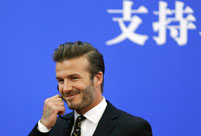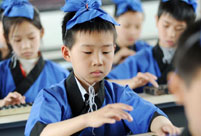 College girls call for protection of ecological space on earth
College girls call for protection of ecological space on earth
 Top 10 celebrities driving auto brands
Top 10 celebrities driving auto brands
 10 low-carbon tips to save money
10 low-carbon tips to save money
 Luxury cars make Asia premiere at Auto China
Luxury cars make Asia premiere at Auto China
 Versatile dog
Versatile dog
 Ni Ni covers BAZAAR JEWELRY
Ni Ni covers BAZAAR JEWELRY
 Cherry blossoms reach peak bloom in Washington D.C.
Cherry blossoms reach peak bloom in Washington D.C.
 Top Chinese fashion icons in foreigners' eyes
Top Chinese fashion icons in foreigners' eyes
 Asia's largest business aviation exhibition to be held in Shanghai
Asia's largest business aviation exhibition to be held in Shanghai
 World's top-rated luxury hotels
World's top-rated luxury hotels
WASHINGTON, April 24 -- As U.S. President Barack Obama's Asia tour this week aims to ease tensions between Japan and South Korea, it would not be easy to dial back ill feelings emerging from their differences on historical issues, some U.S. experts said.
Japanese Prime Minister Shinzo Abe put Tokyo at odds with Seoul in recent months after urging a revision to the Kono Statement - an apology released by then Japanese Chief Cabinet Secretary Yohei Kono for forcing Korean, Chinese and other countries' women to work as the comfort women in military-run brothels during World War II.
The territorial disputes over the islets, known as Dokdo in South Korea and Takeshima in Japan, also lies halfway between the two nations.
"(Obama) is going to have to explain this dynamic where we, the United States, need a good trilateral relationship - a good relationship between South Korea, Japan and the United States," Nicholas Hamisevicz, director of research at the Korea Economic Institute, told Xinhua in a recent interview.
Hamisevicz said that Obama would have to explain Washington's displeasure - in private, away from the cameras and media - and propose a set of solutions.
The U.S. embassy in Japan expressed its disappointment in December with Abe's visit to the Yasukuni Shrine, which honors Japan's war dead including 14 Class A WWII war criminals, saying it was "disappointed that Japan's leadership has taken an action that will exacerbate tensions with Japan's neighbors."
But that won't be easy. South Korea is an increasingly confident emerging power, with a highly emotional population irked by Abe's series of remarks and moves smacking of a throwback to Japan's brutal war regime.
Bruce Klingner, senior research fellow for Northeast Asia at The Heritage Foundation, told Xinhua that Abe's historical revisionist comments are the main driver of South Korea's response, which awakens bad memories of Japan's annexation of the Korean peninsula in the early 1900s.
"There's a long South Korean memory of the occupation and how brutal it was, and any sense that Japan is going back on the "Kono statement" triggers an immediate, strong and emotional response from South Korea," Klingner said.
South Korea has urged Japan to give up its claims on the disputed islets, provide compensation for the comfort women, and print textbooks that admit Japan's wartime aggression. But those are unlikely to occur anytime soon, Hamisevicz said.
As such, South Korea will have to decide which sort of compromises will bring about a satisfactory end to the tensions, he said.
"That's not going to happen by the time President Obama gets back to the United States," after his trip, Hamisevicz said.
Amid pressure from the United States and angry response from Japan's neighbors including South Korea and China, Abe later announced he would not seek to revise the statement.
Still, there have been some positive developments, such as Abe's recent confirmation of the 1993 apology after frank behind-the-scenes discussions with the United States, which enabled a trilateral U.S.-Japan-S. Korea summit in The Hague last month, Klingner said.
 4th Beijing Int'l Film Festival ends
4th Beijing Int'l Film Festival ends Commando elite specializes in sign language
Commando elite specializes in sign language Man photoshops himself into girlfriend's childhood photos
Man photoshops himself into girlfriend's childhood photos Photo story: Stallholders at Beijing Zoo Wholesale Market
Photo story: Stallholders at Beijing Zoo Wholesale Market Artists on backstage
Artists on backstage Beckham launches fund to support youth soccer in China
Beckham launches fund to support youth soccer in China Cherry blossoms hit peak bloom in Washington D.C.
Cherry blossoms hit peak bloom in Washington D.C. Children in ancient costumes learn Zhusuan
Children in ancient costumes learn Zhusuan Tens of thousands celebrate Water Splashing Festival
Tens of thousands celebrate Water Splashing Festival Giant panda Sijia is back to happy life
Giant panda Sijia is back to happy life Richest Chinese of 2014: half from the mainland
Richest Chinese of 2014: half from the mainland Chengdu - laid-back lifestyle makes happiest city
Chengdu - laid-back lifestyle makes happiest city The backstage of the Fashion Week
The backstage of the Fashion Week College students in Han costumes
College students in Han costumes Postgraduate works as waitress
Postgraduate works as waitressDay|Week|Month